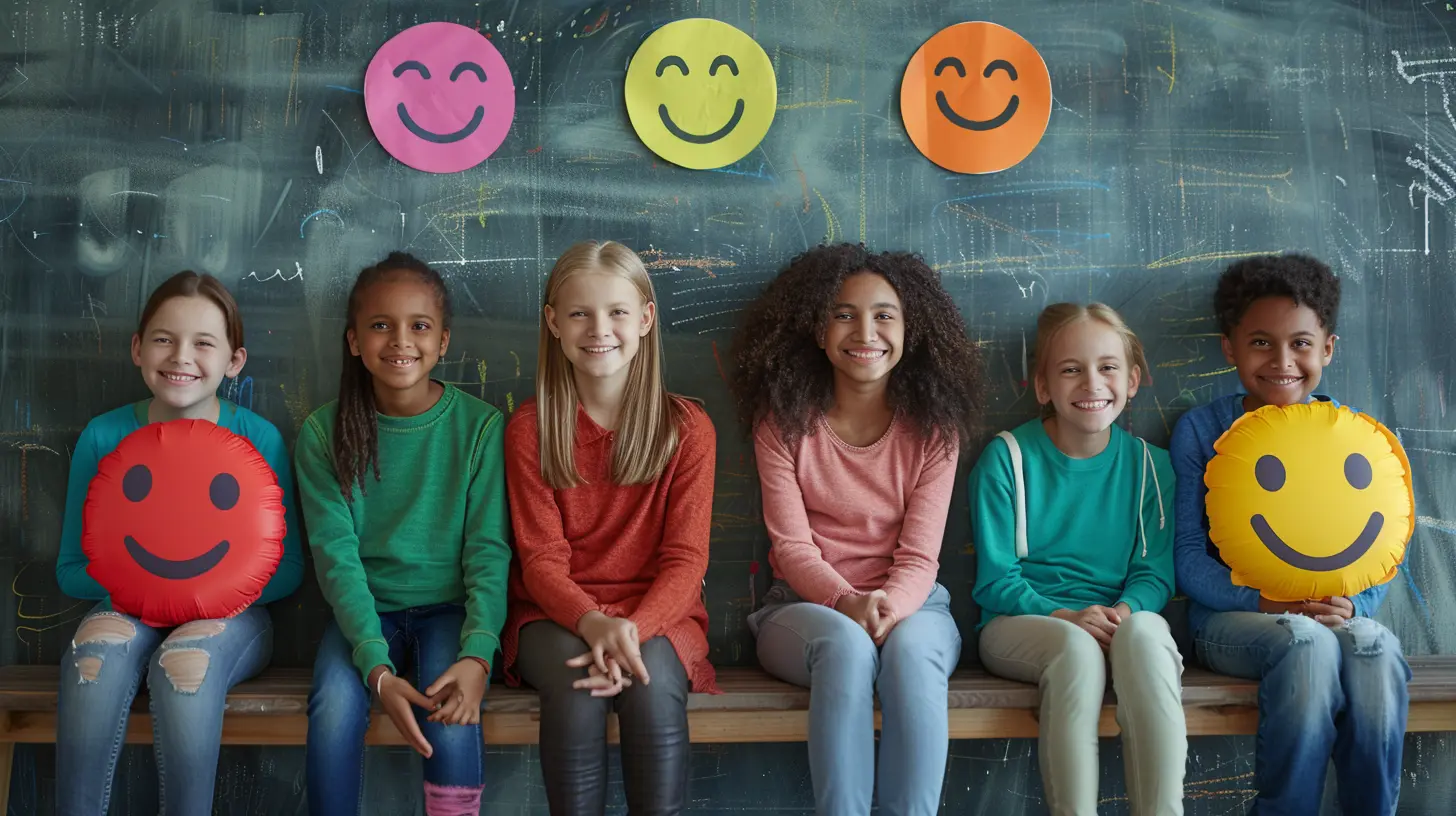"The Role of Emotional Intelligence in Effective Classroom Management
6 May 2025
If you've ever observed an exceptional teacher in action, you’ve probably noticed their impeccable ability to manage a classroom. It's not just about having eyes in the back of their head or the knack for keeping students on task. Instead, there's something deeper going on, something that goes beyond lesson plans and classroom rules. One of the most significant factors contributing to effective classroom management is emotional intelligence (EI). But what role does emotional intelligence truly play in creating a harmonious learning environment? Let’s dive into it!

What Is Emotional Intelligence?
Before we get into classroom management, let's first break down what emotional intelligence is. Emotional intelligence is the ability to understand, manage, and respond to emotions—both your own and those of others. Think of it as your emotional superpower. It’s about being in tune with how you feel, being aware of how others are feeling, and using that knowledge to guide your interactions.Emotional intelligence is often broken down into five key components:
1. Self-awareness – Understanding your own emotions and how they affect your thoughts and actions.
2. Self-regulation – The ability to control impulsive feelings and behaviors, manage your emotions in healthy ways, and adapt to changing circumstances.
3. Motivation – Being driven to achieve goals for personal reasons, not just for rewards or recognition.
4. Empathy – Being able to understand and feel what others are experiencing emotionally.
5. Social skills – Proficiency in managing relationships, building networks, and navigating social complexities.
Now, how does all of this apply to classroom management? Let’s explore.

Why Emotional Intelligence Matters in the Classroom
Imagine trying to manage a classroom without understanding the emotional climate of your students. It’s like trying to steer a boat without checking the weather forecast—you’re bound to hit rough waters. Teaching isn’t just about delivering content; it’s about reading the room, understanding the individual needs of students, and creating a safe, supportive, and engaging environment.1. Building Strong Relationships with Students
Classroom management isn’t just about keeping students quiet and on task. It’s about building relationships with them. When students feel understood and valued, they are more likely to follow rules and engage in learning. Teachers with high emotional intelligence are better at building these connections because they can empathize with students and genuinely care about their emotional well-being.When a student is having a bad day, a teacher with emotional intelligence can recognize that and address the situation with compassion. Instead of reprimanding a student for being disruptive, they might ask, "I noticed you're not yourself today—everything okay?" This simple act of empathy can completely shift the dynamic of the classroom.
2. Creating a Positive Learning Environment
Have you ever been in a classroom where the tension was so thick you could cut it with a knife? Students are more likely to feel anxious, disengaged, or even rebellious in such environments. On the other hand, if a teacher creates a positive atmosphere, students feel safer and more willing to participate.Teachers with strong emotional intelligence can manage their own emotions and stay calm in stressful situations, which directly impacts the emotional climate of the classroom. When a teacher stays calm, students tend to mirror that calmness. It’s like emotional dominoes—one person’s emotion can set off a chain reaction in the whole room.
3. Conflict Resolution
Conflict in the classroom is inevitable, but how it’s handled can either escalate or de-escalate the situation. Emotional intelligence equips teachers with the tools to handle conflicts more effectively. For example, instead of immediately punishing a student for misbehavior, a teacher with emotional intelligence might ask questions to understand the underlying cause.Was the student acting out because they were frustrated about something at home? Did they feel misunderstood by their peers? By addressing the root cause, teachers can resolve conflicts in a way that minimizes future disruptions and helps students develop their own emotional regulation skills.
4. Encouraging Student Autonomy and Responsibility
Teachers with high emotional intelligence understand the importance of giving students a voice. It’s not about controlling every aspect of the classroom but about empowering students to take responsibility for their own behavior.By being emotionally attuned to their students, teachers can recognize when a student is ready for more autonomy and when they might need more guidance. For instance, a teacher might notice that a student consistently finishes their work early and looks bored. Instead of reprimanding them for being disruptive, the teacher might offer them additional challenges or even let them help a peer.
This approach not only helps with classroom management but also fosters a culture of mutual respect and responsibility.

How Teachers Can Develop Emotional Intelligence
The good news is that emotional intelligence isn’t something you’re born with (or without). It’s a skill that can be developed over time. Here are some strategies teachers can use to enhance their emotional intelligence and improve classroom management.1. Practice Self-Awareness
To manage others' emotions, you need to first manage your own. Take time to reflect on how you react to stressful situations in the classroom. Do you get frustrated easily? Do certain students or behaviors trigger strong emotional responses? Journaling or mindfulness exercises can help you become more aware of your emotional triggers and how to handle them.2. Develop Empathy
Empathy is the cornerstone of emotional intelligence. Practice putting yourself in your students’ shoes. What’s it like to be in their position? How might they be feeling in certain situations? By understanding their perspective, you can respond more compassionately and effectively.3. Improve Communication Skills
Emotionally intelligent teachers are great communicators. They listen actively and respond thoughtfully. Practice active listening by giving your full attention to students when they speak, validating their feelings, and providing constructive feedback rather than criticism.4. Stay Calm Under Pressure
Classrooms can be chaotic, but staying calm is crucial for effective management. Practice techniques such as deep breathing or counting to 10 before responding to a stressful situation. The more you can stay calm, the more in control you’ll feel—and the more your students will follow your lead.5. Cultivate Positive Relationships
Building a strong rapport with your students can make all the difference. Make an effort to get to know your students beyond their academic performance. Show interest in their hobbies, listen to their concerns, and celebrate their successes. When students feel connected to you, they’re more likely to respect your authority and adhere to classroom rules.
Emotional Intelligence and Long-Term Classroom Success
Let’s face it—being a teacher is tough. Between lesson planning, grading, and managing behavior, the demands can feel overwhelming. Emotional intelligence is like the secret ingredient that makes the recipe for successful teaching come together. Not only does it help with immediate classroom management, but it also contributes to long-term success.1. Student Engagement
When students feel emotionally safe and understood, they’re more engaged in the learning process. They’re more likely to ask questions, participate in discussions, and take academic risks. Emotionally intelligent teachers create an environment where students feel comfortable making mistakes, which is essential for learning.2. Reduced Teacher Burnout
Teachers who can manage their emotions effectively are less likely to experience burnout. By staying calm and handling conflicts with empathy, they reduce the emotional toll that comes with managing a classroom. In the long run, this can lead to a more fulfilling and sustainable teaching career.3. Improved Academic Outcomes
Research has shown that students in classrooms with emotionally intelligent teachers tend to perform better academically. Why? Because when students feel emotionally supported, they’re more likely to focus on their work, stay motivated, and push through challenges.4. Fostering Emotional Intelligence in Students
Finally, emotionally intelligent teachers model the very skills they want their students to develop. By showing empathy, self-regulation, and strong social skills, teachers give students a blueprint for how to manage their own emotions. This not only helps in the classroom but also prepares students for life outside of school.Conclusion
Emotional intelligence is a game-changer when it comes to effective classroom management. It helps teachers build stronger relationships with students, create a positive learning environment, resolve conflicts, and foster autonomy. By developing emotional intelligence, teachers not only improve their day-to-day classroom management but also enhance their long-term success and well-being.So, the next time you're feeling overwhelmed in the classroom, take a moment to check in with your emotions—and those of your students. You might just find that a little emotional intelligence goes a long way.
all images in this post were generated using AI tools
Category:
Emotional IntelligenceAuthor:

Eva Barker
Discussion
rate this article
6 comments
Winter Perez
Great insights! Emotional intelligence truly enhances classroom dynamics and fosters positive learning environments.
May 17, 2025 at 10:21 AM

Eva Barker
Thank you! I'm glad you found the insights valuable. Emotional intelligence is indeed key to creating a positive and effective classroom environment.
Ximena McVicker
This article beautifully highlights the essential role of emotional intelligence in creating a positive classroom environment. By fostering emotional awareness and connection, educators can enhance their management skills and support student growth. A must-read for anyone passionate about nurturing effective, compassionate learning spaces!
May 13, 2025 at 12:33 PM

Eva Barker
Thank you for your kind words! I'm glad you found the article insightful and valuable for fostering compassion in education.
Indigo Carey
Emotional intelligence is crucial for educators, fostering positive relationships and enhancing classroom dynamics, ultimately leading to improved student outcomes.
May 10, 2025 at 4:14 AM

Eva Barker
Thank you for your insightful comment! I completely agree—emotional intelligence plays a vital role in building connections that enhance both classroom dynamics and student success.
Zariah McFarland
This article highlights a crucial aspect of teaching often overlooked—emotional intelligence. By fostering stronger connections with students, educators can create a more positive learning environment, ultimately enhancing classroom management and student engagement. Essential reading for teachers!
May 9, 2025 at 7:48 PM

Eva Barker
Thank you for your thoughtful comment! I'm glad you found the article valuable in emphasizing the importance of emotional intelligence in education.
Yvette McIntire
Great read! Emotional intelligence really makes a difference in creating a positive classroom environment. Thanks for sharing these insights!
May 7, 2025 at 4:08 AM

Eva Barker
Thank you! I'm glad you found it insightful. Emotional intelligence truly is key to fostering a positive classroom!
Tiffany Velez
Who knew running a classroom was part teaching and part emotional juggling act? It's like herding cats while riding a unicycle—balance is key! Emotional intelligence isn't just for therapists; it’s the secret sauce for keeping both students and sanity intact!
May 6, 2025 at 12:51 PM

Eva Barker
Absolutely! Emotional intelligence is crucial for navigating classroom dynamics and fostering a positive learning environment. It truly is the secret sauce for balancing student needs and maintaining sanity!




